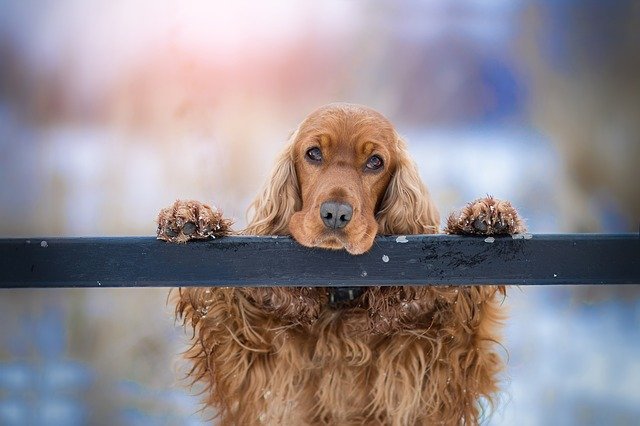Although not the most prolific shedder, Cocker Spaniels are NOT a hypoallergenic dogs.
This double-coated gun dog is a moderate shedder all year round and has two additional sheds in Fall and Spring!
It isn’t just regular shedding that makes the Cocker Spaniel a risk for allergy sufferers; it also sheds allergy-inducing proteins in saliva and urine – things that are not changeable.
So, if you are allergic to dogs, there is a good chance that a Cocker Spaniel will at least leave you congested and itchy!
The Cocker Spaniel Coat
The Cocker Spaniel has a silky double-layered coat that is smooth to the touch.
The undercoat is soft and thick and provides warmth, whereas the topcoat is wavy and long and protects against the elements.
Originally a “bird dog,” the Cocker Spaniel’s coat protects them in the wetlands and cooler water.
Some Cocker Spaniel owners whose dogs do not work often keep their dog’s coat trimmed short year-round.
Coat trimming prevents knotting and tangling and reduces the frequent need for grooming.
Dogs with a double coat are notorious shedders. This Works, and the Cocker Spaniel is no exception.
In addition to moderate year-round shedding, this long-eared pup has two big “sheds” in Spring and Fall as the seasonal temperatures shift significantly.
Before summer, many dogs with double-layered coats “blow their coat”.
The phrase “blow their coat” refers to a significant loss of hair as the thick winter coat thins out to keep the dog comfortable during warmer weather.
When winter approaches, this same group of dogs goes through another significant shed where the thinner summer coat sheds and a thicker coat comes in to keep the dog warm during winter.
Caring for the Cocker Spaniel coat requires some dedication. Cockers should be brushed daily to every three days using a medium-toothed metal comb.
A metal tooth comb allows cocker spaniel owners to gently tease out knots and tangles in the dog’s coat without hurting them.
If a Cocker Spaniel has a long, grown-out coat, it is equally important to keep up with grooming to keep their fur in good condition and prevent painful and heavy matting and knots.
What Are Hypoallergenic Dogs
We know that Cocker Spaniels are not hypoallergenic, but what does it mean to be hypoallergenic?
Dogs are labeled “hypoallergenic” if they are less likely to cause allergy symptoms in someone with a dog allergy.
For example, a Bichon Frise is less likely to cause allergy symptoms than a German Shepherd.
But what makes a dog “hypoallergenic” or less prone to cause an allergic reaction?
Useful: Top 20 Hypoallergenic Dog Breeds – Facts And Considerations.The answer lies in proteins. All dogs produce these specific proteins, but some dogs have higher levels of this protein than others.
Dogs have these allergy-inducing proteins in their skin cells, urine, and saliva.
When someone with allergies is in contact with these proteins, their body begins to fight against them, and symptoms of allergic reactions appear.
Are Cocker Spaniels Hypoallergenic?
No. Cocker Spaniels are not hypoallergenic.
Limiting Allergy Symptoms When You Own a Cocker Spaniel
If you have developed new allergies to your Cocker Spaniel or want a Cocker Spaniel regardless of your allergies, there are a few steps to limit your exposure to allergens.
Regular Grooming
Regular grooming is crucial to the Cocker Spaniel because its long, silky coat tangles and mats easily.
Grooming is also beneficial in removing dead hair and dry skin that would otherwise fall out around your home.
As a bonus, regular grooming also means a cleaner home!
Check out this incredible Self-Cleaning Slicker Dog Brush for Shedding Hair, Fur…
Healthy Diet
Your Cocker Spaniel’s diet is crucial to their skin and coat health. Your dog should always eat a diet optimized to its individual needs.
Ensuring that your pup gets the nutrients they need helps your dog’s body to function optimally.
Optimal functioning means healthy skin, a healthy coat, no itching, healthy oil production, and less dry skin!
Veterinary Care
Veterinary care also plays a vital role in your Cocker Spaniel’s skin and coat health.
For example, regular checkups can track any changes to your dog’s skin and the presence of any infection or parasites – all of which can cause hair loss and an unhealthy coat.
Conclusion / Summary
The Cocker Spaniels are not hypoallergenic dogs.
Like most dogs, the Cocker sheds proteins that provoke an allergy response in someone allergic to dogs.
Fortunately, regular grooming, a healthy diet, and routine vet care can help limit that allergy response by keeping your pup healthy!


